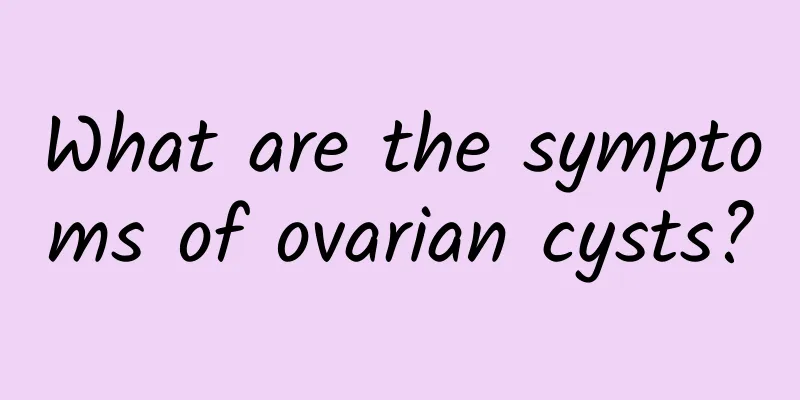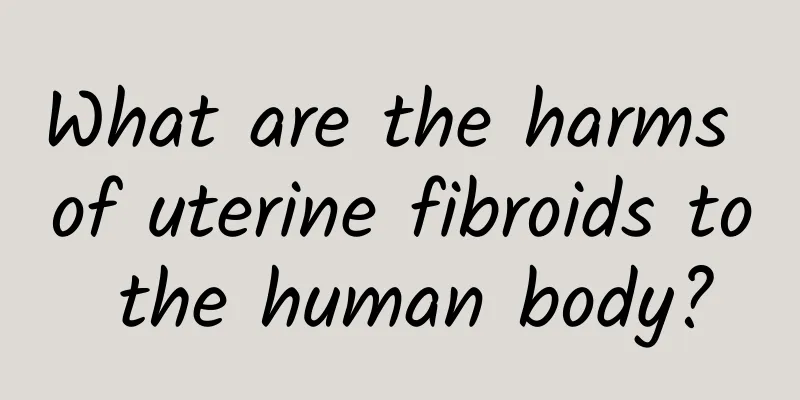What are the symptoms of ovarian cysts?

|
Ovarian cysts are common gynecological diseases in women, and may cause a variety of symptoms, including lower abdominal pain, menstrual abnormalities, abdominal masses, compression symptoms, abnormal vaginal discharge, etc. If you have any discomfort, it is recommended to seek medical attention in time and take appropriate measures under the guidance of a doctor. The details are as follows: 1. Lower abdominal pain: dull pain, distending pain or heavy pain in the lower abdomen. The degree of pain varies from person to person. If the pain is mild, you can observe and use painkillers to relieve it. If the pain is severe and accompanied by symptoms such as fever, surgical treatment may be required, such as cystectomy or oophorectomy. 2. Menstrual abnormalities: Menstrual cycle disorders may cause increased or decreased menstrual volume, prolonged or shortened menstrual period, etc. Endocrine regulation treatment can be performed for menstrual abnormalities, such as the use of hormone drugs to adjust the menstrual cycle. At the same time, depending on the nature and size of the cyst, it is decided whether surgical treatment of the cyst is needed. 3. Abdominal mass: A mass can be felt in the lower abdomen. The mass may vary in size and texture. Ultrasound and other tests are used to determine the nature and size of the mass. If the mass is small and benign, it can be observed regularly. If the mass is large or suspected to be malignant, surgical removal is usually required. 4. Compression symptoms: Frequent urination, urgency, difficulty urinating, or constipation, abdominal distension and other symptoms may occur. Relieving the compression is the key, and surgery is generally required to remove the cyst. Symptoms of the urinary or digestive system caused by compression can be gradually relieved after surgery. 5. Abnormal vaginal discharge: Increased vaginal discharge, color change, abnormal texture, and possibly accompanied by a strange smell. Antibiotics and other drugs can be used to treat pelvic inflammation. At the same time, ovarian cysts can be treated with surgery or conservative treatment depending on the situation. Ovarian cysts have various symptoms. When the above symptoms occur, you should seek medical attention for detailed examinations in time and take appropriate treatment measures after a clear diagnosis. At the same time, women should undergo regular gynecological examinations to detect and treat gynecological diseases such as ovarian cysts at an early stage. |
<<: At what age do women reach menopause?
>>: How to judge uterine prolapse 1st, 2nd and 3rd degree
Recommend
Pelvic inflammatory disease is more likely to occur in winter. How can we prevent it?
When winter comes, when faced with a choice betwe...
How much do you know about the treatment of pelvic inflammatory disease?
Pelvic inflammatory disease is a common disease, ...
Experts talk about how to prevent cervicitis
The occurrence of cervicitis brings inconvenience...
The most common symptoms of vulvar leukoplakia
Among many gynecological diseases, vulvar leukopl...
CT manifestations of various types of uterine fibroids
Uterine fibroids are the most common benign tumor...
What are the precautions after suffering from cervicitis
In recent years, with the development of the time...
Reasons for decreased menstrual flow after abortion
There are many reasons why patients have less men...
What are the complications of irregular menstruation? There are 6 kinds of complications of irregular menstruation
Irregular menstruation is definitely not a trivia...
Will uterine cavity separation disappear gradually in early pregnancy?
The occurrence of uterine separation in early pre...
What is the best way to clean vulva itching?
What is the best way to clean vulva itching? The ...
What should I do if an ovarian cyst is 40*40 with echo? What are the symptoms?
Ovarian cyst 40*40 patients may have echoes durin...
Thread embedding for weight loss is popular, and Western medicine is also included in the Department of Health's proposed management
Many girls like to go to traditional Chinese medi...
Is uterine cyst serious? What are the dangers? I have had some bleeding in the past two days.
Uterine cysts are generally not serious, but if a...
How to deal with vulvar itching
Vulvar itching is a common gynecological problem ...
Eat only protein to lose weight? Don't make these 8 wrong habits
Female celebrities will do anything to lose weigh...









